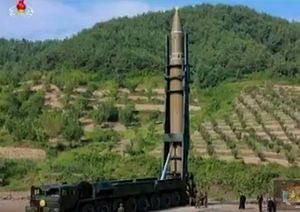On July 4, North Korea carried out its first-ever successful test of an intercontinental ballistic missile. While the reaction from the United States and South Korea was somewhat predictable, the reaction from China and Russia was unusually coordinated and telling — and came shortly after Presidents Xi Jinping and Vladimir Putin met face-to-face in Moscow.
Xi and Putin had already declared their joint opposition to the U.S. deployment of a Terminal High Altitude Area Defense (THAAD) system in South Korea when the launch occurred.
They took the opportunity after the launch to issue a joint statement calling on the United States, South Korea, and North Korea to acquiesce to a “dual freeze” solution: North Korea would freeze its nuclear and ballistic missile testing in exchange for a cessation of conventional exercises by the United States and South Korea.
“The situation in the region affects the national interests of both countries,” the joint statement said. “Russia and China will work in close coordination to advance a solution to the complex problem of the Korean Peninsula in every possible way.”
In the aftermath of such a freeze coming into effect, Beijing and Moscow would welcome a return to multilateral talks — presumably through a resumption of the long-dead Six-Party Talks format that also included Japan.
We saw China make its preference known for this “dual freeze” approach earlier this year when Foreign Minister Wang Yi. The offer was quickly turned down by Washington and Seoul, who continue to see no reason to have the scope of their alliance altered by North Korea’s provocations.
The bilateral statement between Xi and Putin was certainly unusual and could presage a longer term approach by both countries to the North Korean question. Russian opposition to THAAD in South Korea is a fact, placing Moscow’s interests more in line with China’s.
At the core, both China and Russia have more overlapping interests in North Korea than they do divergent ones. In many ways too, while China continues to account overwhelmingly for North Korea’s external trade, the relationship between Moscow and Pyongyang is more positive than that between Beijing and Pyongyang, which continues to be fraught and uneasy.
Diplomacy over North Korea continues to remain effectively intractable. The Trump administration’s early ‘honeymoon’ period with China over the issue appears to be winding down to an end. In meantime, Moscow and Beijing are aligning around the “dual freeze” solution as a way forward.
To be sure, Russia and China remain far from allies and are active competitors in certain spaces. But, when it comes to the question of North Korea, they see common interests and will offer a united front that will have the advantage of at least having the appearance of favoring a peaceful and diplomatic solution that encourages both sides to walk down from the brink.
We can expect this to become a longer term fixture in the international diplomatic space around the North Korean issue.

































